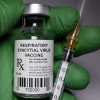Digital Rectal Exams Solely Aren't Accurate In Detecting Prostate Cancer, Reveals a Study
A recent investigation by German scientists expresses that digital rectal exams may not be accurate enough to be a reliable screening tool for prostate cancer. However, a combination of screening tools is probably best for detecting prostate cancer.
Medical professionals still widely use digital rectal exams (DRE) to check the prostate gland for unusual lumps or swelling or lumps in the rectum that can suggest prostate cancer in men. However, new research by scientists of the PROBASE trial coordinated at the German Cancer Research Center in Heidelberg says that this technique may miss many cancers in their early stages. The findings of this study were presented at Italy's recent European Association of Urology Annual Congress.
Dr. Agne Krilaviciute, the study's lead author and a researcher at the German Cancer Research Center, said, "The prime reason for screening for prostate cancer is to catch it in patients at the earliest possible as it renders better outcomes from treatment; however, our study suggests that the DRE is simply not sensitive enough to detect those early-stage cancers."
The PROBASE trial, a German prostate cancer screening study, involved 46,495 men 45 years old between 2014 and 201; half received prostate-specific antigen (PSA) blood tests while the others initially received DRE with delayed PSA screening at age 50.
Krilaviciute said, "Compared with the detection rate employing other methods, like a PSA test, the detection rate using DRE was significantly lower. The DRE rendered a negative result in 99% of cases, and even the suspected cases had a low detection rate." He added, "Results from the PROBASE trial showed that PSA testing at the age of 45 detected four times more prostate cancers than DRE."
The researchers explained why the DRE might fail to detect cancers, particularly in younger men, because tissue changes in the prostate could be very little to detect with a finger. Additionally, some cancers occur in parts of the prostate that a finger can't easily reach.
Investigators express that the results could have wide implications for the early detection of prostate cancer and are calling for other testing methods to be used in routine screening.














Please login to comment on this article